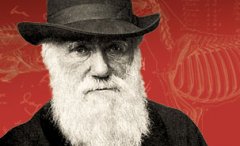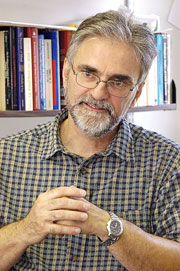 The year 2009 marks the 150 anniversary of Charles Darwin’s On the Origin of the Species – a seminal book that permeated countless disciplines and remains controversial. As February 12 also marks the bicentennial anniversary of Darwin’s birth, several Université de Montréal professors provide insight on how the Father of Evolution influenced biology to anthropology and philosophy to psychology.
The year 2009 marks the 150 anniversary of Charles Darwin’s On the Origin of the Species – a seminal book that permeated countless disciplines and remains controversial. As February 12 also marks the bicentennial anniversary of Darwin’s birth, several Université de Montréal professors provide insight on how the Father of Evolution influenced biology to anthropology and philosophy to psychology.
Darwin and biology
François-Joseph Lapointe, a biology professor at the Université de Montréal, has been teaching the theory of natural selection for two decades. The theory stipulates that all organisms best suited to their environment survive and pass on their genetic characteristics to succeeding generations. ted.
ted.
“I have taught these principles to my girlfriend, my children and I have defended them to creationists. It is surely the one concept I have explained the most often in my life, ” says Lapointe.
According to Lapointe, On the Origin of the Species must be continually reinterpreted in light of new knowledge. This is contrary to the Bible, which creationists believe is a text set in stone.
One of Darwin’s dreams was to elaborate a complete “tree of life” illustrating the interconnectivity between all species. For instance, whales are genetically closer to hippos than hippos are to cows. This means that we must look beyond morphological similarities between species.
 Darwin’s vision and observations has left all of us with a very rich heritage. “There is no doubt in my mind that Einstein and Darwin are the greatest scientists of all time, ” says Lapointe.
Darwin’s vision and observations has left all of us with a very rich heritage. “There is no doubt in my mind that Einstein and Darwin are the greatest scientists of all time, ” says Lapointe.
Darwin and philosophy
Frédéric Bouchard of the Université de Montréal’s Department of Philosophy believes Darwinism has profoundly shaken the foundations of philosophy. “In 300 years from now, there is a greater chance that Darwin will be taught in a philosophy class than Immanuel Kant. It’s a revolution greater than the Copernican revolution, ” says Bouchard who teaches a class on the impact of the theory of evolution on philosophical thought.
It’s a revolution greater than the Copernican revolution, ” says Bouchard who teaches a class on the impact of the theory of evolution on philosophical thought.
“Darwin demonstrated that human beings are the result of chance. We could have been radically different or not even exist. The world could have remained populated by dinosaurs or bacteria. Natural selection has no precise objective. If we are here it’s because our ancestors were lucky, ” explains Bouchard.
The notion of survival of the fittest remains the central and non-negotiable point of the theory. This notion, which wasn’t in the first edition of On the Origin of the Species, removes all clear intention of natural selection.”
Bouchard finds this notion liberating. “It is liberating to find one’s own objectives in oneself rather than based on a divine plan.”






